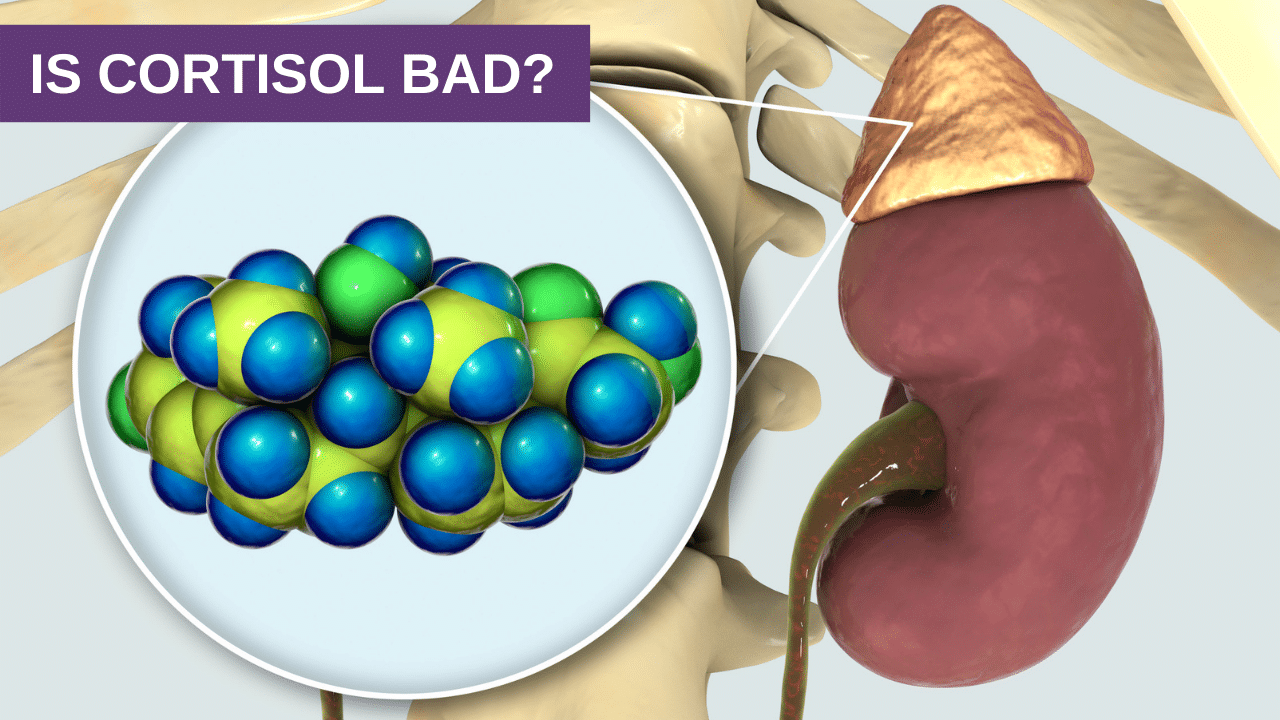Maybe you’ve heard of cortisol as the hormone that causes belly fat. Maybe you’ve been under the impression that cortisol is bad. Is cortisol bad? Well, I’m here to tell you that there are no bad hormones, only hormones out of balance.
If your cortisol is too high, you’ll be very anxious. You won’t be able to sleep. Your muscles will waste away. The lining of your gut will start to become thin. You might start to lose your hair. However, if your cortisol is too low, you’re exhausted. You gain weight. You have brain fog.
Cortisol has to be just right, and in balance with the rest of your hormones.
So what exactly is cortisol? Cortisol is produced by your adrenal glands, and it has its own natural circadian rhythm. When the sun comes up, your cortisol rises and your melatonin drops. It peaks from about 8 am to between 2 pm and 4 pm, depending on whether it’s winter or summer. Then, in the mid-afternoon, cortisol naturally falls.
Animals and humans all experience the natural fall of cortisol. Animals know enough to rest. Some countries still take a siesta, or afternoon nap, during the day. Here in the US, we try to work through our cortisol slump by reaching for caffeine and sugar.
Cortisol rises a bit before dinner, and then peters out within three hours of nightfall, to allow your melatonin to do its job and let you sleep.
Unless, of course, you do not turn off those lights and go to bed. Cortisol also plays a big part in your stress response. You see, when you get stressed, whether it is a tiger chasing you or you are late for work, it is the same response. Your nervous system turns on your adrenals and they produce adrenaline to raise your heart rate and blood pressure so you can get away from the danger or fight it. This is called the fight or flight response. Your hypothalamus responds to the surge in adrenaline by telling your pituitary to tell your adrenals to make cortisol pronto! This is called the HPA axis of the hypothalamus- pituitary-adrenal axis.
Remember, your hypothalamus is the true boss of your body, and your pituitary is just middle management.
The surge in cortisol tells your body to release stored sugar from your muscles and liver. Now you have the fuel for either fight or flight. But what if the danger is not as real as a tiger chasing you? All that sugar floating around in your bloodstream has to go somewhere. So your body stores it for much later – in the fat cells around your middle.
You were not meant to live under stress for long periods of time. Eventually, you would either be caught by the tiger or outsmart the tiger. But in today’s modern world, your hypothalamus is on high alert, constantly being stimulated by your over-stressed nervous system to get you out of danger. Every time you stress out over anything, your hypothalamus tells your adrenals to make more cortisol. And over time, your adrenals get pooped out. This is called adrenal fatigue.
You can balance your HPA axis with de-stress breathing.
One of the best ways to balance cortisol is to calm down your nervous system. A calm nervous system does not hyperstimulate your hypothalamus. A peaceful and balanced hypothalamus will not continuously turn on your adrenals. Once this is achieved, your cortisol production will be blissfully normal.
So how do you calm your nervous system? One simple way is by breathing! But, you say, “I always breathe.” However, you’re probably not breathing in a calming way. When you are stressed, you breathe shallow, quick breaths, taking in less oxygen and further stressing your hypothalamus.
The trick is to learn how to do de-stress breathing!
Place your hands on your stomach. Now, breathe normally. Notice if your hands move much. Probably not. I want you to consciously take a deep breath, using your abdominal muscles to slowly draw in as much air as possible. Notice that your hands have moved out as your stomach expands. That’s good. Breathing super deep like this gives your hypothalamus more oxygen, calming it down.
Take a really deep de-stress breath – with your hands on your stomach, slowly inhaling for at least four seconds, using your stomach to help your lungs. Next, hold your breath for a few seconds. Then, very slowly exhale, taking twice as long as you did to inhale, using your stomach muscles to gently push all the stale air out of your lungs. Notice how your hands move as your stomach contracts.
Take three deep, slow de-stress breaths whenever you feel stressed, and you will immediately calm down. Practice de-stress breathing every day. This will help balance your Hypothalamic-Pituitary-Adrenal axis. As a result, you’ll begin to have normal cortisol production, which means less belly fat, and less fatigue!
Want to learn more ways to de-stress and lose belly fat? Check out my new course, Hormone Healing: Optimizing Your Adrenal Health.



I started Genesis Gold today (2/1/22), and just watched the cortisol/de-stress breathing video. I read a while back about a 4-7-8 breathing technique to help you fall asleep when you just can’t seem to turn your brain off about one issue or another. One night a few months ago, I was really anxious about work, and (finally) remembered to try the 4-7-8…inhale for 4 seconds, hold for seven, exhale slowly for eight, and repeat three times…I remember after the third rep. thinking, well I’m still awake…but that is all I remember, because the next thing I knew, the alarm was going off – it worked!
It has never crossed my mind since then that I could/should practice this daily – thanks for the tip!
I have high levels of this and my Dr says it is normal and this is causing me not to get pregnant.